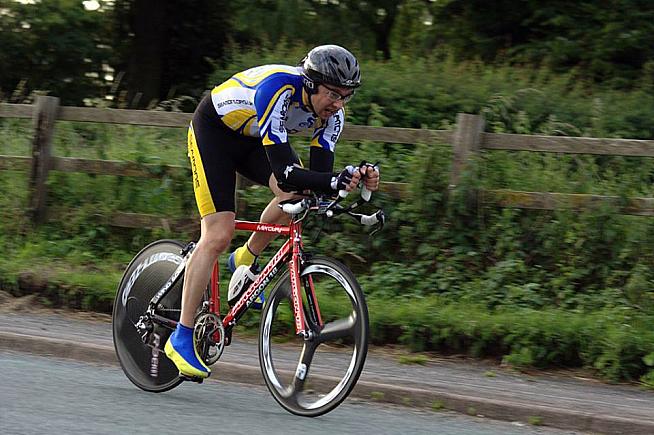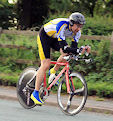So you ride sportives and you like to race against your mates. Have you hoovered up all the Strava segments in your area? You need a new challenge. What about racing? But is racing just for fearless hard men and tough girls with the group riding skills to match their aggressive tendencies? Well no, of course not. There is a branch of racing which anyone can do, requires no special equipment and no group riding skills. What's more, you can simply turn up at some events, pay £3 or so and race. Ladies and gentlemen, I give you time trialling.
Time trialling is a form of bike racing where individuals - sometimes known as 'testers' - race solo against the clock, setting off at one minute intervals. No drafting is allowed, and the fastest rider wins. Time trialling is the oldest form of cycle racing in the UK, with over a century of history. Originally illegal, it quickly grew as a subversive, underground movement, a complete contrast to the sometimes parochial world of modern-day time trialling. Throughout the history of British cycling virtually all our great champions cut their teeth on a 'club ten'.

Many cycle clubs around the country run evening races during the spring and summer. They usually start in the evenings at seven-ish, and are generally 'tens' (i.e. a 10 mile course). Such events are known as 'club' events and although the organising club might reserve a number of race slots for its own members, the remainder will be open to other riders. From super fast lads on specialist carbon bikes with disc and tri spoke wheels, to older riders with saddlebags on touring bikes, time trialling truly is a sport for all. You could even time trial on a shopping bike. All that matters is that you go back the next week and try and beat this week's time. And you will....it's a drug, and seeing your name on a set of results is a powerful motivator.
Most bike racers start off doing club tens. A ten does not require membership of the organising club, or indeed membership of any club, and most clubs allow non members to race for a few reasons. One is that friendships and rivalries build up through racing, and friends from different clubs like to race together and maybe have a beer afterwards. Another is that getting to know people from the organising club while racing with and against them acts as a strong recruitment tool for most clubs.
I joined my cycle club in this manner. I was originally a triathlete who used a particular club ten as a hard training session, interspersed with a thirty mile round trip to and from the race. When I got injured one season and could not run I concentrated on cycling. And got faster, and faster. The by-product was getting to know people, and I joined the club. Friendships were formed that have lasted ever since.
Usually you can just turn up an hour or so before the first rider starts and sign on. You'll get a number, this goes on your lower back. The number comes with pins, stick it on...warm up and get to the start line five minutes before your allotted start time. With one minute to go, you'll be called to the line, which is usually a chalk line on the road. You can be 'held up' if you like (someone holds the back of your saddle/bike and you clip both feet into the pedals). You'll get a 30 second count, then ten, nine, eight..... suddenly it's GO, and just as as you power into the first pedal stroke you'll get a push off.
Now you are a racing cyclist, the same breed as Indurain, Cancellera, Obree, Burton et al... The world is your oyster. Enjoy the rush, and the ride.
To find time trials held in your area your best bet is to check out your local clubs. Many will have information on their websites. Further information and a list of events can also be found on the Cycling Time Trials website: www.cyclingtimetrials.org.uk.
0 Comments





